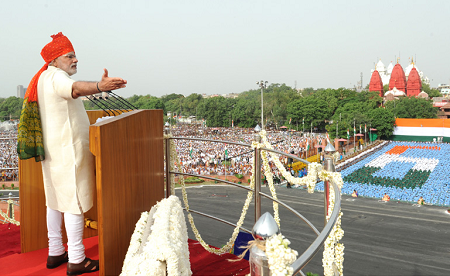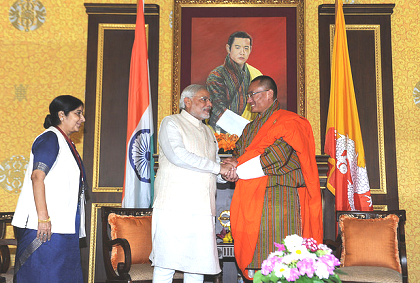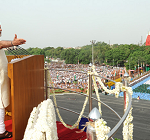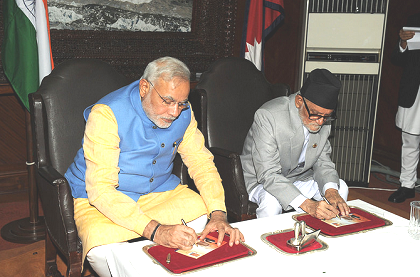The Narendra Modi government has been hyperactive in the foreign policy arena in these first 100 days. The new government wants to overturn the Congress and Nehruvian consensus that has dominated India’s foreign policy thinking, and the way the world has viewed India.

South Asia
By inviting all the SAARC heads to his swearing-in ceremony, Modi signaled his intent to focus on the neighbourhood.
The Modi-Sharif bonhomie at the swearing-in ceremony raised hopes that the quality of interaction between the two neighbours would change. But Pakistan is imploding, so India should direct its energies to strengthening ties with the other SAARC countries.
Modi’s decision to make Nepal and Bhutan his first foreign policy stops must be followed up as both countries have massive hydropower potential.
India should push through the Teesta water-sharing accord and the Land Boundary Agreement, as well as undo the damage caused by communal rhetoric on illegal immigrants from Bangladesh.
The Sri Lanka government has made positive overtures by releasing Indian fishermen and sharing intelligence on LeT operatives. However, India must reiterate that the Thirteenth Amendment to the Sri Lankan constitution is the basis for ending the discrimination faced by Sri Lankan Tamils.
India, Modi and the neighbourhood
Prime Minister Narendra Modi has time and again stressed on giving India’s neighbourhood priority. In his address to the nation on India’s Independence Day, Modi called upon the SAARC countries to join the battle against problems that go beyond borders – the challenge of poverty and development.
“India’s foreign policy has many facets,” said Modi, “But I want to focus on our relations with our neighbours in my speech,” he told the audience at the Red Fort that included more than 140 diplomats who were provided a live translation of the speech over headphones for the first time.
Modi said the SAARC region had a common history relating to the freedom movement. “Our common forefathers fought for freedom together. If without weapons or resources we could defeat a powerful sultanate (British rule), can’t we win against poverty together?” Though Modi did not elaborate on how he planned to take his vision forward, but the change of content in his speech marked a new beginning in India’s relations with its neighbours. Read more
Modi: charting a new foreign policy course
Seema Sirohi, Gateway House analyst, examines Narendra Modi’s first month in office which saw him deftly handling India’s neighbours, accept an invitation to visit Washington, enhance relations with Bhutan and accord due importance to China Read More
Narendra Modi: global perspectives
Gateway House presents perspectives from experts from SAARC countries on the changes they expect to see in India’s foreign policy in the Modi era Read More

Karma Ura, President of the Centre for Bhutan Studies, examines how closely Bhutan’s economy is linked to that of India’s, and despite pressures from powerful countries, Bhutan has always kept Indian interests paramount. Read More
India-Bhutan: hydropower diplomacy
Amit Bhandari, Energy & Enviornment Studies Fellow, highlights how the India-Bhutan relationship is underpinned by hydropower. About how India helped develop Bhutan’s power projects and we purchase the surplus energy. Read More
The benefits of a settled border
Neelam Deo, Director, Gateway House, talks about the implications of the UN tribunal’s recent ruling on the India-Bangladesh maritime boundary dispute. Read More
India-Nepal: a Himalayan opportunity
Amit Bhandari, Energy & Enviornment Studies Fellow, underlines how Modi’s announcement of hydropower being a key area of synergy in the India-Nepal bilateral will help India solve its electricity shortage. Read More
Raising the bar on India-Myanmar ties
With a 1600-kilometre-long shared border, and a maritime boundary in the North East, Myanmar is critical to India’s Look East policy. Wasbir Hussain, executive director of the Centre for Development and Peace Studies, highlights how India has to look beyond the China bogey in order to find ways to truly consolidate ties with Myanmar. Read More



